Student Profiles
Program alumni are the best resources for students interested in going abroad, and they are available to answer your questions. If you would like to talk to a recent student about their experience in Japan, get in touch with the advisor, Susan Parsons.
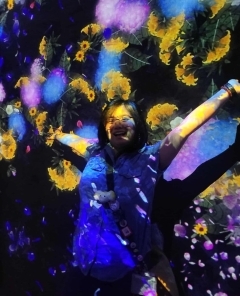
Susan Le, Middlebury College
When you choose to study abroad in Tokyo, it means welcoming an experience full of self-growth and cultural immersion. I had to step out of my comfort zone in many ways, whether it meant navigating the trains for the first time, learning unspoken rules, and speaking in Japanese with locals. It was scary at first to say「すみません!」when trying to get a waiter’s attention, or「おすすめは何ですか?」when trying to find the best Japanese music CD’s, but over time I became comfortable and even proud of my growth. Although it might seem overwhelming to hear Japanese all around you, trust me when I say you will get used to it over the course of the program.
At the same time, International Christian University (ICU) is the perfect match with an liberal arts education like Middlebury. The classes leave you enough breathing room to explore Tokyo, but are challenging enough to keep you on your toes. When we first arrived on campus, the cherry blossoms were in full bloom, with the petals scattering and landing in people’s hair. That is when I really thought “This is Japan.” The wonderful staff, the affordable dining hall, and the Family Mart right next door are also supportive and wonderful. Even better, you’re likely to dorm with and spend time with folks from other colleges also studying Japanese with you. This helps to set you up perfectly for a great time exploring and enjoying what Japan has to offer together.
Toward the end of the program, we left the city behind for a trip for a weekend in Tenryuu-mura, a small rural village in Nagano. We picked our own tea leaves, grilled savory gohei-mochi and yakiniku with the locals, and immersed ourselves in nature. However, the village isn’t just pretty landscapes and scenery. Through talking with Kawakami-san and talking with the locals, we learned about the nearly forgotten tragic history of the village having kept prisoners-of-war for forced labor. As we toured the monuments with their names engraved, I realized how important it is to use our cultural experiences and language skills to hold space for difficult conversations. Going over the history of the village while admiring the beautiful mountains and landscape, Tenryu-mura was the prime location for reflecting on how significant learning Japanese can be.
Studying abroad in Japan isn’t just about the nice food and places you get to see, but also connecting with the people that live and work there. Thanks to the time I spent in Japan, I was able to have an enriching academic experience full of self-growth, reflection, and cultural exchange.
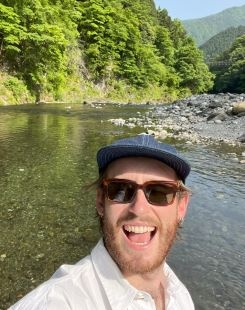
Will Sutherland, Yale University
During the Middlebury Program orientation in Yokoze-machi last year, some new friends and I wandered into a local onsen. I spoke broken Japanese to the attendants, handed over a five-hundred yen coin, and soon found myself sitting and sweating in a sauna, wondering how it might feel to live for a year in Japan.
A year in Japan is perfect for introspection and exploration. Tokyo, especially, is a city for wandering until your feet have blisters and you have no choice but to duck into the nearest izakaya and sit up at the counter with a plate of karaage. I found community in Tokyo by wandering. Through the Middlebury program’s internship requirement, I was able to work in Kichijoji at a bar and restaurant that I’d stumbled upon one night while walking home with a friend. There, I met a group of chefs, bartenders, musicians, and artists who became great friends, and who welcomed me into their world. I learned to cook the karaage that I’d eaten so often, I listened to psychedelic music played by local bands, and I spent many nights sitting around exchanging stories with people I’d never have met if I hadn’t wandered into that particular restaurant on that particular night.
A year at Middlebury in Japan is about saying “yes”. It’s about introducing yourself to the stranger sitting next to you at the counter, going on a weekend trip to an onsen in the mountains, taking a bullet train through a typhoon to get to a Japanese knitting class you scheduled in a prefecture outside Tokyo, climbing Mt. Fuji overnight to see the sunrise, and doing all the things that might push you outside your daily routine.
Twelve months after our orientation in Yokoze-machi, I entered another onsen in Tokyo, hours before my flight home. I spoke confidently to the attendants, I read the signs in Japanese about bathing etiquette, and I sat sweating in the sauna, thinking back on a year filled with worthwhile discomfort and countless opportunities.
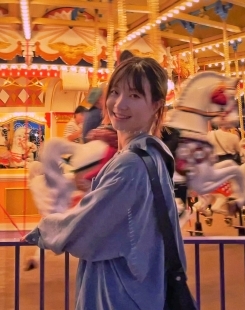
Vivian Xu, Yale University
If you have wondered what it’s like to enter a parallel universe, spending a year at Middlebury’s School in Japan might be for you.
One year - not too long and not too short, out of expectation and out of context. For me, though, it was quite necessary. Now that it’s ended, I found myself standing at a place that feels both exactly the same with (my short-term plans before and after the year in Japan have not changed) and completely different from where I started. I feel like a different person - with new skills, new friends, new memories, new growth, new possibilities… It’s almost like I entered a parallel universe.
Maybe you should look through my photo album, or read the text exchanges between me and my friend from high school. Maybe you should go to Gūtara, tell Akira-san I said hi, and get your ramen-bowl sized up for free. Maybe you should go to Yokohama, sit for a while on a bench in Yamashita Park, and look for the people fishing for crabs while listening to the sound of the waves. These are the things that will not change, though they might change you.
If I had just deleted my Instagram highlights, nobody would’ve remembered that I was even there. But I want you to know. I want you to feel. I want you to laugh and cry and love and hurt and understand. How many chances does one get in each life to experience the “could-have” anyway? I can only look back on my time in Japan. But you can go.
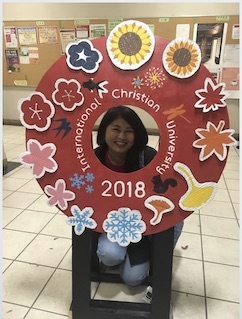
Elisabeth Clemmons, Wellesley College
When I was abroad in Japan, I learned the meaning of immersion. The most immersive, meaningful moments are the smallest ones - the ones where you find yourself absorbed in the details of a world that is slowly but surely becoming your own.
For example, at the beginning of my semester, amid the flurry of activities - roasting campfire vegetables, cutting rice stalks, conversing nonstop with everyone from school children to municipal officials - one of my most vivid memories simply switching outdoor shoes for slippers when entering the elementary school. They were made of white cloth, and their soles were slightly too thin. But they were roomy, comfortable, and I liked the way they slid across the clean, wooden floor. And when I looked back at the “genkan” foyer, I remember being struck by the array of colors of everyone’s outdoor shoes.
There are many other small details that remain in my mind. Folding thick, fluffy futon in thirds. The jingle that plays when your ordered dish arrives at conveyor sushi restaurants. The little flags hanging over the door of our sensei’s office. The blue plastic box in convenience stores where I put a 100 yen coin to buy tuna mayo onigiri. Bike stands filled to the brim.
Going to a new place is full of challenges and exciting events. And in Japan, from internships to field trips in Tottori to the ICU School Festival, there was certainly no lack of big discoveries. But the things that remain with me the most are the tiny things that make Japan what it is. It is the small sights, smells, and sounds that truly immerse you and transform your worldview from outside in.
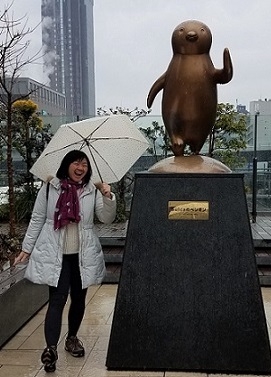
Celinda Chang, Tulane University
When I left for Japan, I cried because I was scared. Now, as the program comes to an end, the tears are returning because I can hardly fathom the fact that I have to leave.
The School in Japan helped me take advantage of the study abroad experience. We were provided with an excellent balance of support and guidance along with independence to learn and explore on our own. Through fieldwork in Yokoze, Tottori, Kyoto, Kusatsu, and Nikko, we also had many opportunities to learn outside of the classroom, seeing different sides of Japan that we wouldn’t have been able to through tourism. We were pushed to think about and do things outside of our comfort zones. Because of this, I learned to be more comfortable with risk-taking and the unknown.
There are a multitude of things I experienced and accomplished that I never would’ve imagined possible when starting to learn Japanese. Intern/volunteering at a hospital’s palliative care unit, writing a 17-page research paper on Japanese Kampo medicine, completing group projects in Japanese content courses, exploring school life and making friends though three dance clubs, navigating solo travel- these became some of my most beloved experiences and accomplishments, yet would seem impossible to my past self from just last year. I jumped through four levels of Japanese, going from barely being able to describe my likes and dislikes to preparing to challenge the JLPT test (N2) after the end of the program.
Among all there is to do and see in Tokyo, what completed the experience was the people I encountered. The friendships I made through the School in Japan, Japanese language courses, ICU clubs and dorm life, and more are ones I will cherish forever. I’m thankful for the conversations, laughs, tears, and more that have become my beloved memories.
I can confidently say that my year abroad in Japan has been one of the best years of my life.
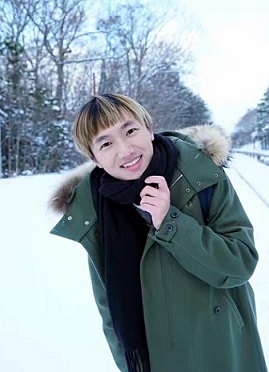
Yiyao (Derek) Ding, Middlebury College
They say ICU is far away from the downtown area of Tokyo, but it only took me 25 minutes to go to Shinjuku and another 15 minutes to go to Ginza, the two best-known central districts. Not only is ICU easily accessible to most parts of Tokyo, but its suburban location also grants its students the privilege to study extensively and passionately, to immerse in the picturesque surroundings composed of parks, rivers and an avenue fringed with cherry-blossom trees, and to form deep bonds with many wonderful people. I have indeed enjoyed my time there.
Middlebury School in Japan facilitated my transition and maximized my ability to take advantage of my life in Japan. As a group, we went to Kyoto and Tottori to learn about different aspects of Japanese culture. The knowledge I gained from working on a farmland and brainstorming with locals to invent projects that can stimulate economic growth far exceeds what I could learn from solely perusing secondary sources.
One of the best experiences that I had was interning at a floral shop. My mentor, a talented senior florist, was so generous that she invited me to attend the Paris Fashion Week as her assistant. Never had I imagined myself working with world-class professionals in a language that I had only studied for two years. It was definitely a challenge, but more importantly an invaluable opportunity.
Studying abroad is always a challenge. I needed to step out of my comfort zone by meeting new people and exploring a foreign land. But in my case at least, there is no regret but a plan to return.
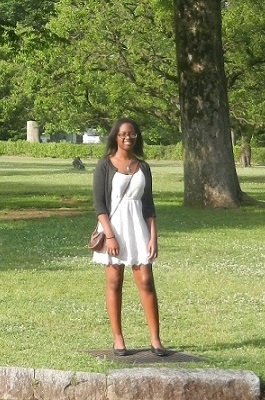
Sheridan McKisick, Wellesley College
One of my favorite experiences in Japan started out as my most terrifying: getting lost. The Middlebury coursework involved a lot of independence and risk-taking that I probably wouldn’t have chosen for myself so early on in the program. But instead of getting in the habit of going everywhere with friends, an easy trap for study abroad students to fall into, I learned the value of being able to explore alone. Nothing felt better than getting lost and asking for directions (and understanding those directions) and ultimately coming to better understand my surroundings. Having chances to travel alone and solve problems by myself gave me an unfounded confidence in the Japanese language that I never had before the program. I was applying this skill not only while navigating the streets of Japan and in the classroom but in my daily life. I joined the university’s newspaper club and created their website; I had an internship at an NPO regarding children and imagination through digital media. By the time I left, I could communicate beyond just being understood—I could make someone think, I could make someone laugh, I could make someone smile.
